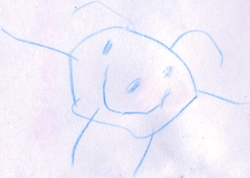jan
 | |
| Pronunciation | /jan/ 🔊 🔊/j/ sounds like English Y, as in "fjord" or "hallelujah". |
|---|---|
| Usage | 2023: Core (100% ↗︎ )2022: Core (99%) |
| Book and era | nimi pu |
| Part of speech | Content word |
| Codepoint | U+F1911 |
| Part of a series on |
| Core words |
| Widespread words |
| Nonstandard animal words |
jan is a core content word relating to people and humans.
Etymology[edit | edit source]
The word jan was derived from Cantonese 人 (Jyutping: jan4), meaning "person, someone".[1]
Semantic space[edit | edit source]
The semantic space of jan includes both humans (members of the species Homo sapiens) and people (the definition of which more abstract). These concepts usually but not always coincide; it is debatable whether jan applies to hominids, aliens, robots, talking animals, or tokiponists with headnouns other than jan, and whether groups containing them should be addressed as jan. For that reason, some speakers avoid using it as a general term.
jan li ponajan li pona.
People are nice.
ken jan li samaken jan li sama.[2]
The rights of humans are the same.
The Hominidae are sometimes referred to as jan or soweli jan.[3]
Headnoun[edit | edit source]
Most people use jan as the headnoun of their name.[4] Non-Tokiponists often mistake this for the name Jan and refer to them as such. A simplified explanation that avoids getting into the philosophy and grammar of Toki Pona names is that jan acts as an honorific.
jan [ale luka uta]jan Alu
Person named Alu
pu[edit | edit source]
In the "Official Toki Pona Dictionary" section, the book Toki Pona: The Language of Good defines jan as:
NOUN human being, person, somebody
ku[edit | edit source]
For Toki Pona Dictionary, respondents in ma pona pi toki pona translated these English words as jan:[5]
person5, human5, people5, anybody4, dude4, anyone3, character3, somebody3, guy3, being3, individual2, civilian2, whoever2, citizen2, participant2, Hominidae2, personal2
sitelen pona[edit | edit source]

The sitelen pona glyph for jan () is a pictogram of a human head and shoulders, a shape commonly also used as a default profile picture. Rarely, two eye dots are added by analogy to other animal words (akesi, pipi, soweli, waso, etc).
An alternative interpretation of the glyph is a head and legs. This may be thought to evoke child art of tadpole people, torsoless figures whose limbs connect directly to the head.
The main glyphs for mije and meli are derived from the glyph for jan and are variations with wider shoulders and long hair, respectively.
sitelen sitelen[edit | edit source]
References[edit | edit source]
- ↑ Word Origins. Archived from the original on 2 November 2019. Toki Pona.
- ↑ jan Melon [janMelon]. (29 September 2020). "lipu lawa pi ken jan pi ma ale - toki pona UDHR" (in Toki Pona). Imgur. Retrieved 16 March 2024.
- ↑ Lang, Sonja. (18 July 2021). Toki Pona Dictionary. Illustrated by Vacon Sartirani. Tawhid. ISBN 978-0978292362. p. 101.
- ↑ jan Tamalu. (3 November 2023). "Results of the 2022 Toki Pona census". Toki Pona census. Retrieved 25 December 2023.
- ↑ Lang, Sonja. (18 July 2021). Toki Pona Dictionary. Illustrated by Vacon Sartirani. Tawhid. ISBN 978-0978292362. p. 217.
Further reading[edit | edit source]
- "jan" on lipu Linku
- "jan" on lipu Wikipesija
- "jan" on English Wiktionary
